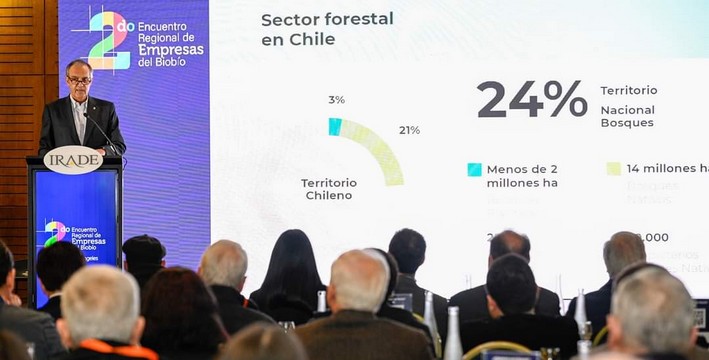- During a business meeting, the president of CMPC, Luis Felipe Gazitúa, expressed his dissatisfaction with the difficulties in developing projects in Chile, contrasting with the vision of the Minister of Economy.
The president of CMPC, Luis Felipe Gazitúa, echoed in Los Ángeles, Biobío Province, the growing concerns of the private sector about the feasibility of making large investments in Chile.
Addressing government representatives and business leaders, Gazitúa pointed out that, unlike other Latin American countries, Chile has lost the conviction that private industry is an engine of development, leading the company to consider mega-projects abroad, such as a major pulp investment in Brazil.
The executive added, "A pulp factory is an investment of around $4 billion today. You understand that no one in their right mind would start a $4 billion investment when the project could take 14 years. That makes the project unprofitable."
The Minister of Economy, Nicolás Grau, present at the event organized by Irade, acknowledged that while companies naturally seek to invest in other markets, it is crucial for Chile to maintain a positive balance between foreign investments received and those made abroad. Grau emphasized that the challenge is not to lower permit and regulatory standards but to streamline processes while maintaining high requirements.
The issue of "permitting" and its impact on productivity and investment attraction has been a recurring topic in business debates. Recently, the president of Sofofa, Rosario Navarro, noted a decline in the number of projects submitted to the Environmental Impact Assessment Service, which could be interpreted as a sign of exhaustion in the current system.
This scenario is reflected in Chile's drop in the Economist Intelligence Unit (EIU) ranking of the best countries to attract investment, although the country still leads in Latin America. Experts suggest that the policies of Gabriel Boric's government may be influencing this less favorable perception for business.
The discussion on how to improve collaboration between the public and private sectors to reverse the economic slowdown and facilitate investment remains open, with the hope of finding a path that benefits both industry and the country's sustainable development.







Comments (0)
No comments yet. Be the first to comment!
Leave a comment